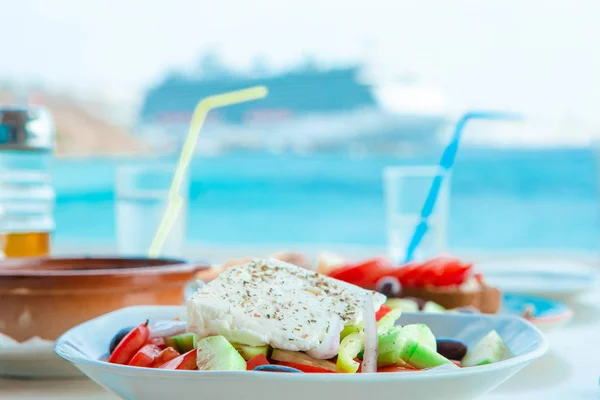Share this @internewscast.com
A new study “How Mediterranean and MIND Diets Could Boost Cognitive Health” analyzing data from middle-aged females investigates the potential benefits of a Mediterranean or a MIND diet on cognitive health. As we age, maintaining sharp cognitive function becomes increasingly important. Unfortunately, age-related cognitive decline affects many individuals, raising concerns about memory, focus, and overall brain health. But amidst the concerns, a ray of hope shines through in the form of dietary strategies. Recent research suggests that the Mediterranean and MIND diets hold significant potential for bolstering cognitive health, especially in midlife.

Dietary Stars for Brain Health: Unveiling the Mediterranean and MIND Diets
The Mediterranean Diet: Inspired by the traditional dietary patterns of countries bordering the Mediterranean Sea, this diet emphasizes:
- Fruits and vegetables: Aiming for at least 7 servings daily ensures a rich intake of antioxidants and essential vitamins.
- Whole grains: Quinoa, brown rice, and whole-wheat bread provide sustained energy and fiber for gut health.
- Healthy fats: Olive oil, a cornerstone of the diet, boasts anti-inflammatory properties and heart-healthy benefits.
- Moderate fish and poultry: These offer good sources of omega-3 fatty acids, crucial for brain function.
- Limited red meat, saturated fat, and added sugar: Excessive intake of these can contribute to inflammation and hinder cognitive function.
The MIND Diet: This acronym stands for “Mediterranean-DASH Intervention for Neurodegenerative Delay“. It combines the best aspects of the Mediterranean and DASH diets, adding emphasis on brain-boosting foods:
- Leafy green vegetables: Rich in folate and B vitamins, these support cognitive function and brain health.
- Berries: Packed with antioxidants, they protect brain cells from damage.
- Nuts and seeds: These provide healthy fats, vitamin E, and other neuroprotective nutrients.
- Beans and legumes: High in fiber and protein, they contribute to satiety and gut health.
- Poultry: A good source of choline, important for memory and learning.
- Limited fried foods and pastries: These contribute to unhealthy fats and inflammation.
The Twin Study: Unveiling the Cognitive Edge of Dietary Choices
A recently published study in Alzheimer’s & Dementia: Translational Research & Clinical Intervention sheds exciting light on the potential of these diets. Researchers analyzed data from 509 female twins, some genetically identical (monozygotic) and others fraternal (dizygotic). They tracked their dietary adherence to the Mediterranean and MIND diets over ten years and assessed their cognitive function throughout the study.
The results were striking: twins who adhered more closely to either diet displayed better preserved episodic and visuospatial working memory after ten years. Notably, this benefit was more pronounced for the Mediterranean diet, highlighting its potential power in cognitive protection.
But how do these diets translate into sharper minds? While further research is needed, the study suggests two potential mechanisms:
Gut bacteria and short-chain fatty acids: These diets promote the growth of beneficial gut bacteria that produce short-chain fatty acids (SCFAs). SCFAs can reduce inflammation, improve blood flow to the brain, and even stimulate the growth of new brain cells.
Antioxidants and anti-inflammatory properties: Both diets are rich in antioxidants and anti-inflammatory compounds found in fruits, vegetables, and whole grains. These can combat oxidative stress and inflammation, two key contributors to cognitive decline.
Beyond the Study: Building a Holistic Approach to Brain Health
It’s important to remember that this study focuses specifically on midlife females, and more research is needed to confirm these findings across diverse populations and age groups. Nonetheless, the results add to a growing body of evidence suggesting that dietary choices can significantly impact cognitive health.
However, diet is just one piece of the puzzle. For comprehensive brain health, consider these additional lifestyle factors:
- Regular physical activity: Aim for at least 150 minutes of moderate-intensity exercise weekly.
- Quality sleep: Prioritize 7-8 hours of quality sleep each night.
- Mental stimulation: Engage in activities that challenge your mind, such as learning a new language or playing brain games.
- Social interaction: Maintain strong social connections to combat loneliness and isolation, which can negatively impact cognitive health.
Putting Dietary Power into Practice: Simple Steps for Sharper Thinking
Ready to incorporate these brain-boosting dietary principles? Here are some practical tips:
- Start small: Gradually incorporate more fruits, vegetables, and whole grains into your diet.
- Swap red meat for fish and poultry: Aim for at least two servings of fish per week.
- Embrace healthy fats: Drizzle olive oil on salads and use avocado instead of butter.
- Snack on brain-friendly foods: Choose nuts, seeds, or a handful of berries over sugary treats.
- Cook more at home: This gives you greater control over ingredients and portion sizes.
Delving Deeper: What the Science Tells Us About Specific Nutrients and Cognitive Function
While the Mediterranean and MIND diets offer a framework for brain-healthy eating, understanding the key nutrients within them can further empower your dietary choices. Here’s a closer look at some individual contributors to cognitive health:
- Omega-3 fatty acids: Found in fatty fish like salmon, sardines, and mackerel, these essential fats promote brain development, memory, and learning. Aim for two servings per week.
- Folate: Crucial for neural development and neurotransmitter function, folate deficiency has been linked to cognitive decline. Green leafy vegetables, beans, and fortified cereals are rich sources.
- Vitamin D: Deficiency in this “sunshine vitamin” is associated with increased risk of dementia. Include fatty fish, egg yolks, and fortified dairy products in your diet, and consider a supplement if needed, guided by your doctor.
- Curcumin: This compound found in turmeric exhibits anti-inflammatory and antioxidant properties that may protect brain cells and improve cognitive function. Add turmeric to curries, smoothies, or enjoy it in supplement form.
- Resveratrol: Found in red grapes, blueberries, and dark chocolate, this antioxidant may improve blood flow to the brain and support cognitive function. However, moderation is key due to potential interactions with medications.
- Fiber: Not only beneficial for gut health, but fiber-rich foods may also reduce inflammation and improve cognitive function. Aim for at least 25 grams of fiber daily through fruits, vegetables, whole grains, and legumes.
- Stay Hydrated: Even mild dehydration can negatively impact cognitive function. Aim for eight glasses of water per day or adjust based on individual needs and activity levels.
Addressing Concerns and Overcoming Challenges: Tailoring the Approach to You
Embracing a new dietary approach can be daunting. Here are some common concerns and strategies to navigate them:
- Cost: While fresh produce and fish can be expensive, consider cost-effective options like frozen fruits and vegetables, canned fish, and budget-friendly whole grains like brown rice or lentils.
- Time constraints: Meal planning and prepping can save time in the long run. Cook larger batches and freeze portions for easy access. Utilize kitchen gadgets like slow cookers and instant pots for convenient healthy meals.
- Picky eaters: Involve family members in choosing recipes and grocery shopping. Focus on gradual changes and highlight the health benefits and improved well-being associated with the new dietary approach.
- Social gatherings: Navigating social settings with dietary restrictions can be challenging. Be prepared with healthy alternatives to unhealthy snacks and politely communicate your dietary needs to hosts.
Remember, consistency is key! Small, sustainable changes over time have the most significant impact on your overall health and cognitive well-being.
Seeking Professional Guidance: When to Consult a Healthcare Professional
While these dietary strategies offer promising benefits, personalized guidance from a healthcare professional can be invaluable. Consider consulting a registered dietitian or nutritionist for:
- Creating a personalized meal plan tailored to your needs and preferences.
- Addressing any underlying health conditions or medication interactions.
- Receiving guidance on specific nutrient and supplement needs.
- Developing strategies for overcoming individual challenges and achieving sustainable dietary changes.
The Future of Food and Brain Health: Exciting Research on the Horizon
The science of food and brain health is rapidly evolving. Ongoing research explores the intricate interactions between diet, gut microbiome, and cognitive function. Some promising areas of investigation include:
- Personalized nutrition based on individual gut microbiome profiles.
- Development of functional foods fortified with specific brain-boosting nutrients.
- Tailored dietary interventions for specific neurodegenerative diseases.
As this research progresses, we can expect even more sophisticated and targeted dietary approaches to further optimize cognitive health and brain function throughout life.
Remember, you are empowered to take charge of your cognitive health! By embracing a brain-healthy diet, incorporating other lifestyle elements, and seeking professional guidance when needed, you can pave the way for a sharper mind and a brighter future.









